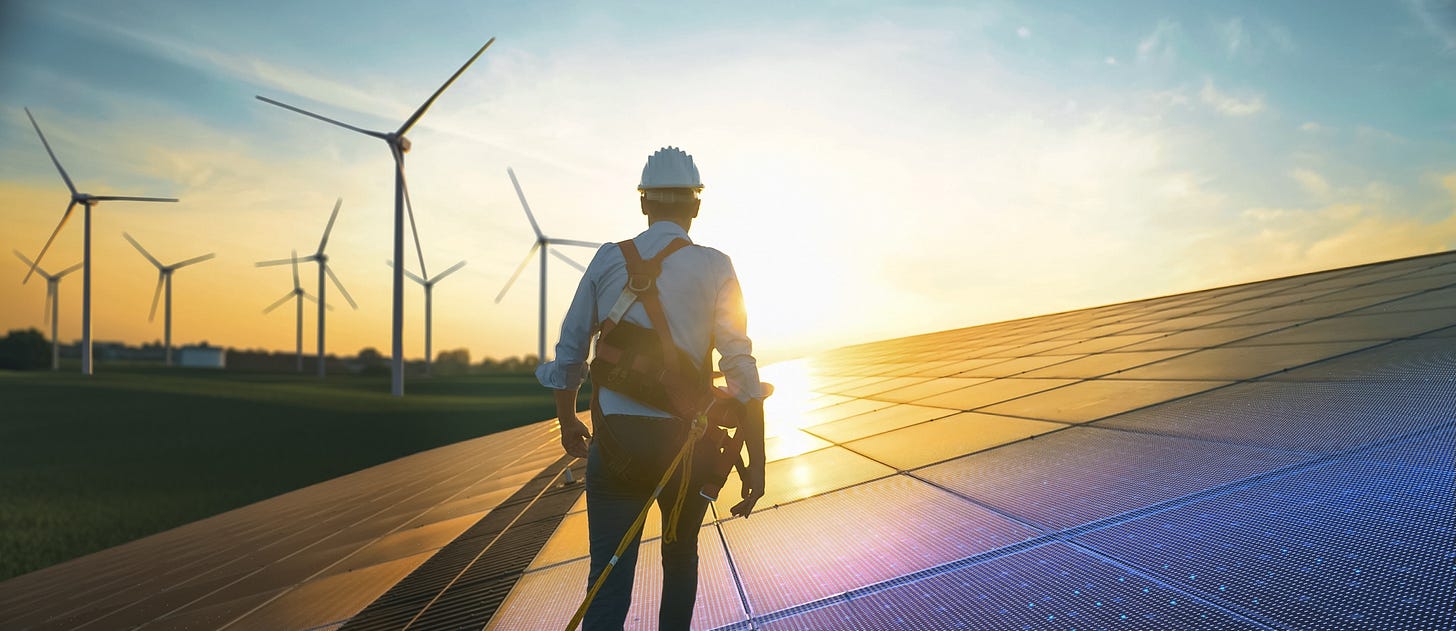More green energy is powering the globe every day
Global renewables surge, fossil fuel and climate change impacts on mothers and babies, and how to prepare for the hurricane season
For the last few weeks, I’ve been talking about the risks of extreme heat – and it continues to make headlines. Last week, temperatures exceeding 51C (124F) killed over a thousand Muslims on pilgrimage to Mecca. In Greece, scientists now suspect extreme heat is responsible for a growing number of tourist disappearances and deaths. In the U.S., a third of the population remains under an extreme heat advisory which scientists have determined is 35 times more likely because of climate change, and psychologists say makes people “more frustrated and stressed and exacerbates existing mental health conditions.”
Extreme heat is no joke: see this previous edition for ideas on how to stay safe, and ensure your family and friends do too.
GOOD NEWS
During extreme heat, air conditioning use and electricity demand spikes: so it’s very good news that renewables generated a full 30 percent of electricity worldwide last year, according to the Global Electricity Review 2024. When you add in nuclear power, the amount of electricity from carbon-free sources jumps to 40 percent globally. “A new era of falling fossil generation is imminent. 2023 was likely the pivot point,” the report’s executive summary says.
China led the way, accounting for 51 percent of new solar and 60 percent of new wind worldwide in 2023. Last year alone, China installed more solar energy than the U.S. has in its entire history. In Texas, where I live, solar also outpaced coal for the first time ever this March and it’s the economics of clean energy that are turning the tide.
As the Financial Times explains: “It’s not that politics don’t matter. But economics, which shape politics, can turn even the biggest climate change skeptic* into a clean energy evangelist.” And a new study agrees: researchers found the increase in wind and solar generation from 2019 to 2022 generated $250 billion in climate and air quality benefits in the U.S. alone. It just makes sense!
*Personally, I don't use the word skeptic when it comes to climate change. Why not? Because, in tens of thousands of exchanges with people who attack the science, I've never met a single genuine skeptic. That's because, if anyone truly doubted that digging up and burning fossil fuels produces heat-trapping gases that are building up in the atmosphere, wrapping an extra blanket around the earth and causing it to warm, they'd also doubt that stoves heat food and airplanes fly. It's the same science. So where do the science-y sounding arguments claiming climate isn't changing or humans aren't responsible come from? They're just palatable excuses for the real issue, "I don't want to fix it."
NOT-SO-GOOD NEWS
Here's some really not so good news: over a third of premature births across the planet can be attributed to the mother's exposure to particulate pollution from fossil fuels, according to a new study. Not only that, but pregnant women, babies, and children are uniquely vulnerable to climate risks. Last week, Climate Central released a new report highlighting how heatwaves disproportionately impact children. They explain how “babies and younger children have difficulty regulating their core body temperature; and young children sweat less and acclimate to heat more slowly than adults.”
"Climate change is not a distant health threat,” Anshu Banerjee, the WHO’s director of maternal, newborn, child and adolescent health and aging, said. “While awareness of climate change has increased, actions to safeguard the lives of those at most risk have barely scratched the surface of what’s needed. For climate justice to be achieved, this must be urgently redressed.”
If you’d like to know more about how fossil fuel pollution and climate change affect mothers and babies, check out the Green Docs podcast with Bruce Bekkar, M.D. and Nathaniel DeNicola, MD, MSHP. Each episode is dedicated to helping people understand how climate change is threatening our health.
WHAT YOU CAN DO
The Atlantic hurricane season kicked off June 1 and this season NOAA is predicting "above-normal hurricane activity" with between 17 to 25 named storms. Already this week Tropical Storm Alberto hit Mexico and Southern Texas, leading to flooding and causing at least three deaths. So, if you live on the Gulf or Atlantic coasts of Central or North America, or anywhere else in the world that’s affected by cyclones or typhoons, now is a good time to make sure you are prepared.
Ready.gov has a handy, 12-page PDF that walks you through all the steps, and many of these tips apply for flooding and other weather disasters, too. For example, make sure you're signed up for weather alerts, familiarize yourself with evacuation routes and emergency shelter locations, and pack an emergency kit and a go-bag in case you need to leave home.
Try to always keep your EV charged or gas tank half full in case you need to leave. Also, think about a plan for your pets if you have to evacuate, and make sure they are micro-chipped. You should also make a plan to communicate with members of your family during an emergency.
Lastly, think about how to secure your home during a storm. For wind, consider trimming trees that could fall on your home and removing objects that might be blown around in high winds. For floods, take steps to make your home more flood-resistant, including regularly cleaning your gutters and waterproofing your basement.
Flood insurance is typically a separate policy from your regular homeowner’s insurance. Most policies take 30 days to take effect, so it’s wise to get one in place well ahead of hurricane season if it’s available in your area.
And as always, don’t forget to share this information with people you know, especially if they live in a coastal area. Some parts of the world are more exposed than others to climate risks; but wherever we live, there are practical steps we can all take to reduce our vulnerability and the more climate changes, the more important they become.





Dr Hayhoe you are just an amazing communicator! Thank you.
Expressing interest in building partnership with your organization to protect Ghana Basin For Climate Change.